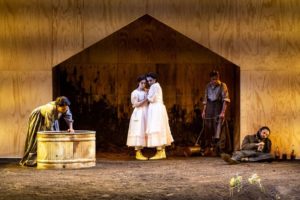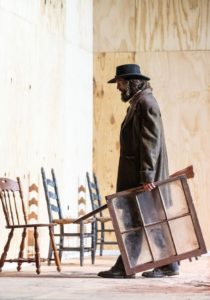
Photo by Rob Davidson for Miller Theatre
When Metropolitan Opera czar Peter Gelb dashed from the Miller Theatre to a waiting car after the Friday performance of the opera Proving Up, I would’ve given more than a penny for his (unfiltered) thoughts.
Only days before, he and new music director Yannick Nezet-Seguin announced the first female composers to be commissioned by the Metropolitan Opera, and one of them being Missy Mazzoli, who has long been considered a paragon of edgy Brooklyn artistic chic. Her third opera Proving Up arrived for two performances Sept. 26 and 28 – at this theater on the Columbia University campus, though my guess is that the Met commission was made on the strength of her formidable previous opera Breaking the Waves. And this new one? It was not more of the same. It’s different. Really different.
Music like this has rarely if ever been heard at the Met. It’s highly personal, visceral without being obvious, and taps into the cruelest regions of the human soul. It’s true that Proving Up isn’t slated for a Met production and, since it’s a chamber opera, probably won’t be. But in the new work she’s planning specifically for the Met – possibly an adaptation of the Geroge Saunders novel “Lincoln in the Bardo” in which the president communes with the spirit of his deceased son – this self-possessed composers isn’t likely to temper her vision for anybody. There may be no such thing as Mazzoli lite.
“I’m very careful to tailor each work to the situation in which it will premiere, keeping in mind the strengths and restrictions of each venue and organization,” she said in an email exchange that I had with her prior to the Sept. 26 Proving Up performance. “This work will be just as edgy as all my other work, fear not!”
The Met will be inhabiting smaller venues for more experimental work. But not, as it turns out, for her. “It will be presented in the big house.” she said. “I’ve dreamed about it since I was 15 years old, but I’ve also dreamed about winning an Oscar and befriending David Bowie, so I don’t know how connected these dreams are to reality.”
As much as her score to Proving Up initially seems like a quantum leap forward, it represents, to my ears, a welcome consolidation, in which Mazzoli’s disparate artistic selves have come together. While Breaking the Waves handled difficult operatic subject matter in reasonably traditional, linear ways, Proving Up went into less reality-based terrains, even though the story ostensibly is set in a place that’s anything but dreamy. Adapted from the Karen Russell short story of the same name, the setting is isolated, rural Nebraska homesteaders in 1868, working their land for five years and meetings other stipulations to achieve total ownership and thus achieving that elusive, malleable thing known as the American dream.
We can barely imagine what this Nebraska life must have been like. People lived in windowless houses built from sod, in a harsh, isolated world where logic and moral codes take on less-than-universal peculiarities. The government insists that, to achieve ownership, there must be what I interpret as a pretense of civilized living: A glass window. That was hard to come by out there, so the homesteaders traded glass windows among themselves. And the journey between farms became a netherworld that recalled Waiting for Godot (Godot being the government inspector) and Oedipus with strange, merciless people and events (like eye gouging) encountered along the way. The thorny Zegner family that lies at the core of the opera also resemble the contentious post-apocalyptic brood in the David T. Little opera Dog Days (which also had a Vavrek libretto). This is not suggest any lack of originality; it’s only a description of possible antecedents.
The music would have to be unsettling, and it is. In Breaking the Waves, Mazzoli improved on the original Lars von Trier movie partly by dispensing with the film’s expansive setup shots. Proving Up has a more elusive pace. It doesn’t feel atonal as much as unmoored, ironically, from any earth under its feel. It’s relaxed tonality in the sense that few chords point in any sort of prescribed direction, even more so than Debussy at his most abstract. Busy violin arpeggios, woozy bass lines, out-of-kilter fiddle tunes and dazed, wandering piano solos come, go and return. Instruments arrive in all manner of pairings, always with a psychological and musical precision. Curiously, seven acoustic guitars were lined up inside of the orchestra pit, and they mainly seemed to be used for an isolated drive-by strum. Fleeting harmonica sounds are emblematic of the music’s strangeness: They’re played by onstage women who portray deceased characters taking delight in everybody’s downfall, and don’t actually play tunes but use harmonicas to emit an eerie wheeze.
The music feels more like weather than anything else – which makes sense in a world where weather is a matter of life, death, profit and debt. And if Hell is a place where nothing makes sense, then this world is indeed Hell, with just enough traditional order to make you realize how empty and illogical this world on other levels. At times, I was kicking myself for not having found a copy of the libretto to read before walking into the Miller Theatre on Friday night, But after a certain point, I don’t think it would’ve made much sense.
Previously, Mazzoli has seemed like two composers in one, something like Aaron Copland, whose popular Americana works always had a less-known counterpoint in more formal, modernist-accented works such as his 1950 Piano Quartet. Mazzoli’s other life falls under the heading of indy rocker, but not in ways that label would suggest. Her “Cathedral City” album by her mostly-instrumental band Victoire takes a similar approach as Proving Up toward tonality amid layered instrumental textures and keen attention to sound quality. Ambient music is part of the mix, but is orchestral in its vision, substance and magnitude. These qualities are what give the Proving Up score its weather-like quality. It’s also hard to understand the opera without know that side of her.

My complaints about the opera – and I do have them – are parked at the doorstep of librettist Vavrek. It The story’s foundation in reality needs to be more firmly maintained. The glass window image – that final requirement for “proving up” or achieving ownership of the land – is somewhat flimsy. The windows become a symbol similar to Wagner’s Nibelung ring with its immense power cursed by its having been stolen and thus acquiring the curse of ill-gotten gains. But while the Nibelung gold is brutally stolen, the glass window is salvaged from what appears to be an abandoned farm. The minute it is picked up by patriarch from the next farm, though, the music tells you something is dire has happened. And then seemingly innocent parties pay for this non-crime.
I do like the idea, floated near the end, that the window allows you to see much more, things you don’t want to see. But the window has no innate power to change lives. What it gives the homesteaders is a piece of paper and with that a sense of landowner’s pride, but does that offer immunity to weather that causes their crops to fail? It’s there that the libretto is on to something: The American Dream often has no more value than a mirage. Considering that the earliest impulses for writing Proving Up were in the wake of the 2008 financial crisis, this is an extremely powerful concept. People’s lives were ruined during The Great Recession due to the promise of adjustable-rate mortgages. And now that the business world is being systematically deregulated, it’s going to happen again. We can take to the streets, yell all we want, but we are still at the mercy of Washington and arbitrary rules that spell out the more modern, elusive goal of “proving up.”
So many antecedents, so many ideas could easily be confusing had the production directed by James Darrah and performances played by International Contemporary Ensemble not been so smart and clear. The Adam Rigg scenic design had central floor rectangle that took up most of the stage, and was apt in conveying a world of delineated farm territories, with some of the more shadowy activity taking place just outside of that. Though the set was too small to properly separate the live characters from the dead ones, there was some good stage wizardry with a mechanical horse that starts the central character of Miles on his journey. And Miles was played by Michael Slattery, a fine tenor who also trafficks in the musical theater world, and was particularly notable for bringing a sort of inner vigor to his work in Proving Up. Inevitably, worthy work among performers tends to be overlooked in new operas because viewers are so busy understanding the piece itself. Sorry.
But Proving Up and this production aren’t going to disappear. And when it comes back to the New York City area, I’ll be there. And I’m willing to bet Peter Gelb will be there too. When I fleetingly saw him a few nights later at a Guggenheim Musuem event, I mentioned seeing him at the Mazzoli opera and his face immediately lighted up. So he liked it.

